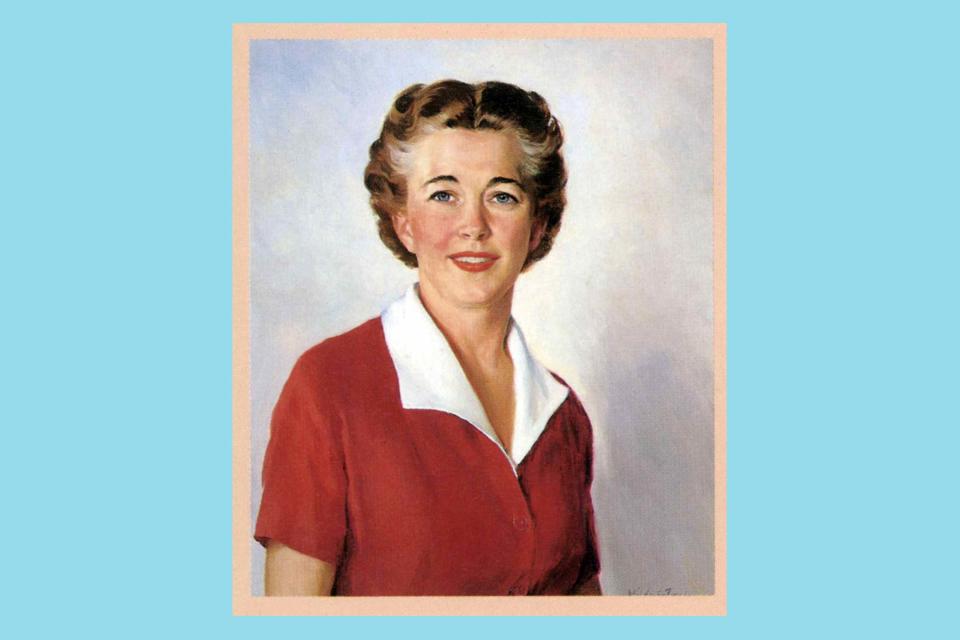Betty Crocker, an American Icon
It's been more than 100 years since Betty Crocker first appeared on the scene, but despite her legendary status, her peculiar origins from deep within the patriarchy aren't well-known.

It wasn't until last year, when I was reading Jess McHugh's Americanon, that I learned that Betty Crocker, one of the most recognizable women of all time, is a fictional character. Crafted by a marketing company as what could arguably be called one of the first influencers, Crocker provided what we might now call "life-inspo" for millions of homes across the country, including my own where she showed up on cake mixes and frosting packages at countless celebrations.
McHugh's Americanon explores the most America-defining books throughout our history. Among these is Betty Crocker's Picture Cook Book, which was published in 1950. Since then, it has reigned as one of the best-selling cookbooks in U.S. history. Though the cookbook was meant to instruct generations of women in the kitchen, it also quickly became a guide for women to become good wives, mothers, and people in general. According to McHugh, Betty Crocker played a major role in establishing the domestic woman through acting as a role model, friend, and confidant.
:35 Boxed Ingredients These Chefs Always Have in Their Pantries
Fortune magazine dubbed Betty "America's First Lady of Foods" in 1945. When I spoke with McHugh, she told me, "From a historical perspective, Betty Crocker is an invention. Washburn Crosby Company, which became General Mills in 1928, had an advertisement about a puzzle to be solved and sent back in for a prize. Thousands of women sent letters alongside their completed puzzles asking baking questions, which surprised the advertising team of men."
Rather than sign letters with their own names in response, McHugh explained that the advertising team invented a new name – Crocker for William G. Crocker, a recently retired executive, and Betty because they thought it sounded wholesome, signed by their female secretary. In 1921, this "ideal" woman was born, and October 21 was cited by Washburn Crosby as her birthday.
During the early twentieth century, Betty was presented by the company as a model for women to emulate when it came to being virtuous and skilled homemakers, serving themselves, their families, marriages, and even their country. Though Betty started her charge by giving advice on baking, she didn't just stick to food. She was a figure for millions to go to to discuss economics, marriage, family, and love, through pamphlets, cookbooks, letters, and on radio shows where she was anonymously played by home economist Agnes White for 20 years. Betty discussed economics, marriage, family, and love, offering support, advice, and refuge through war times and in peace.
:Chef Boyardee Was a Real Person Who Brought Italian Food to America
McHugh, in her book, discusses how many women felt as though she was a real friend, never knowing that she was the invention of a panel of men with the aim of making a profit. By the advice of "Betty," she said, a delicious meal was no longer a pleasure to be enjoyed; rather it was the difference between, "a happy husband and a violent one; good, Christian children and sickly, immoral ones; a powerful nation and a weak one."
"Whether or not women were responding, she was a product of a patriarchal consumption commercial society. She was built to sell products and encouraged women to continue to work in domestic life," McHugh said to me. "Some [women] would write, 'After the war, I want to keep my job,' or, 'I don't want to have that many kids,' but she would insist on how important staying in the home was."
Betty's power as the face of a massive brand influenced the way women acted and the foods they cooked, making General Mills products a staple in millions of homes. In spite of Betty Crocker and General Mills' encouragement of women to become politically engaged throughout the 1940s by reading newspapers and forming their own opinions, the company set a disingenuous standard for decades to come for women through the creation of Betty. "The most famous woman in the public eye wasn't even a real woman," said McHugh. "Her legacy is this idealized vision of womanhood and life, that these people working for General Mills and this idea of being a good wife is inseparable from being a good person."
Today, we can acknowledge the impact of the Betty Crocker icon — one deeply entrenched in the interests of the patriarchy — but we also raise our cupcakes to a future where a love and appreciation for baked goods isn't so layered with that expectation. It might even be a piece of cake.
false

